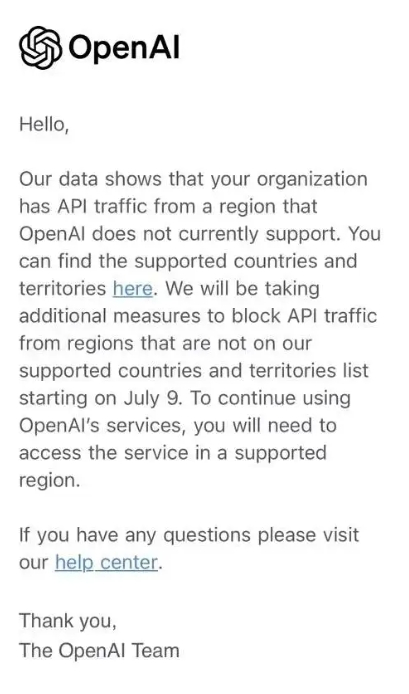OpenAI Announces Closure of "National Service" Domestic Shell Company to Swim Naked?
Will the American sword of Damocles force China's domestic models to grow rapidly?
On June 24, OpenAI sent emails to many users, stating that it will stop API usage in unsupported countries and regions.

In this brief email of less than 100 words, OpenAI first mentioned that the users' "organization's API traffic comes from a region currently unsupported by OpenAI." Affected organizations must access OpenAI services from a supported country or region to continue using them.
OpenAI also stated that starting from July 9, the company will begin blocking API traffic from unsupported countries and regions. Public information shows that OpenAI's whitelist includes 161 countries and regions, but mainland China and Hong Kong are not included. This means that OpenAI's API services in China have been effectively terminated.
This move by OpenAI could seriously impact companies in the Chinese market that have deeply integrated OpenAI's API. Over the past year and a half, as OpenAI gained significant popularity, many Chinese companies joined the large model competition, leading to the emergence of numerous domestic shell mirror websites. Now, as the tide recedes, many will be left exposed.
One immediate impact is that these companies' existing projects, especially those heavily reliant on OpenAI models, may not continue unless they find equivalent domestic large models. However, since OpenAI has never allowed phone registration from China, many users and companies in China have accessed the service by setting up servers, which might mitigate the impact of OpenAI's "service suspension."
Despite this, some domestic large model vendors are quickly responding, hoping their products can replace OpenAI. Following OpenAI's email, Zhipu AI swiftly announced a special migration plan for OpenAI API users, offering 150 million tokens and system migration training. AI infrastructure vendor SiliconCloud launched "Token Freedom," announcing permanent free access to top open-source large models like Qwen2-7B, GLM-4-9B, and Yi-1.5-9B. SiliconCloud founder Yuan Jinhui humorously remarked that they have made a large number of models free today, encouraging users to take advantage without bankrupting them.
Analysts suggest that OpenAI's action may be related to recent personnel changes.
On June 13, OpenAI announced that retired U.S. Army General Paul M. Nakasone would join the company's board of directors. Public records show that Nakasone is a top expert in cybersecurity, technological advancement, and global cyber defense. He previously led the National Security Agency, responsible for protecting America's digital infrastructure and enhancing its cyber defense capabilities. Industry speculation suggests that Nakasone may be behind OpenAI's decision to terminate API services to China and other countries.
Shortly after, on June 22, the U.S. Treasury Department released a draft rule requiring regulation of certain U.S. investments in semiconductors, microelectronics, quantum computing, and artificial intelligence, prohibiting or restricting Chinese investments in AI and other technology fields. In response, China's Ministry of Commerce stated that China has noted the U.S.'s release of relevant documents and urged the U.S. to respect market economy principles and fair competition, stop politicizing and weaponizing trade issues, and remove investment restrictions to create a favorable environment for China-U.S. economic and trade cooperation.
It is understood that this U.S. ban will complete public comment collection by August 4, suggesting that the new regulations could be implemented by the end of the year as planned. The draft aims to regulate certain U.S. investments in semiconductors, microelectronics, quantum computing, and AI to prevent proprietary U.S. technology from aiding China's development of cutting-edge technology or dominating global markets.
If the ban is implemented, it could lead to more sanctions against China by U.S. tech companies, including OpenAI. Will this Damocles' sword from the U.S. force China's domestic large models to grow rapidly?
·Original
Disclaimer: The views in this article are from the original Creator and do not represent the views or position of Hawk Insight. The content of the article is for reference, communication and learning only, and does not constitute investment advice. If it involves copyright issues, please contact us for deletion.